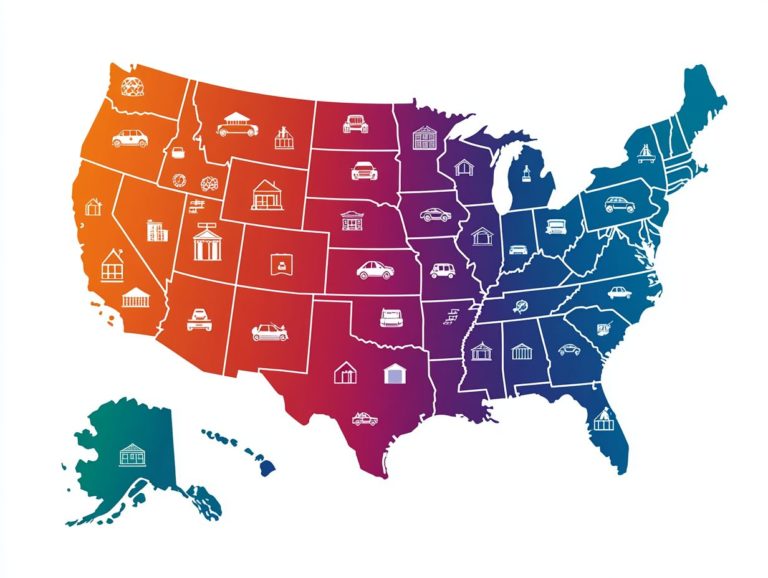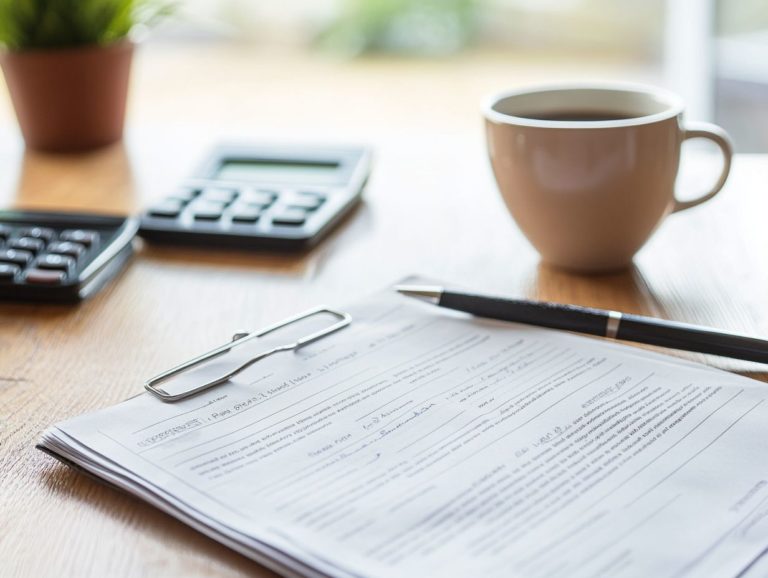How to Avoid Underinsurance When Comparing Policies
Underinsurance can place individuals and families in a precarious position when they require protection the most. Grasping the concept of underinsurance and the associated risks is essential for anyone aiming to secure their assets and well-being.
This article delves into the repercussions of insufficient coverage, offers actionable steps to ensure comprehensive protection, and outlines critical factors to weigh when comparing insurance policies. With these practical insights, you’ll be well-prepared to select the policy that best aligns with your needs.
Contents
- Key Takeaways:
- Understanding Underinsurance
- Risks of Underinsurance
- How to Avoid Underinsurance
- Comparing Insurance Policies
- Tips for Choosing the Right Policy
- Frequently Asked Questions
- What is underinsurance and how does it affect me?
- Why is it important to avoid underinsurance when comparing policies?
- How can I accurately assess my insurance needs to avoid underinsurance?
- What should I look for when comparing policies to avoid underinsurance?
- What are some common mistakes to avoid when comparing policies to prevent underinsurance?
- Is it possible to have too much insurance coverage?
Key Takeaways:

- Underinsurance leaves you vulnerable in the event of a disaster or accident, so it’s important to understand what it is and how to avoid it.
- The risks of underinsurance include financial loss and inadequate coverage, which can have serious consequences for policyholders. Take steps to ensure you have adequate coverage for your needs.
- When comparing insurance policies, consider key factors such as coverage limits, deductibles, and exclusions. Seek expert insights and recommendations to help you choose the right policy for your specific needs.
Understanding Underinsurance
Understanding underinsurance is essential for property owners, as it highlights the gap between the coverage provided by their home insurance and the actual costs of rebuilding or replacing their property and belongings. This situation often stems from inadequate property valuation, resulting in insurance policies that fall short of meeting financial needs in the event of a loss.
Without the right coverage, you risk facing significant financial burdens, leaving you vulnerable if disaster strikes and potentially hindering your ability to recover fully.
What is Underinsurance?
Underinsurance happens when your home insurance policy doesn t quite cover the full rebuilding cost or the actual market value of your property and its contents. This often occurs when homeowners underestimate the value of their belongings or the expenses linked to repairing or rebuilding their homes after a disaster.
Unlike comprehensive coverage, which considers all the costs involved in restoration, underinsurance can leave you in a precarious financial position during critical moments. It s crucial to grasp the difference between a property s market value and its rebuilding cost. While market value is shaped by current real estate trends, rebuilding costs reflect the actual expenses for materials and labor needed to restore your home.
Policies like homeowners insurance and replacement cost coverage are designed to offer robust protection, but their effectiveness ultimately depends on accurate property valuation, ensuring you re adequately covered against unexpected losses.
Risks of Underinsurance
The risks tied to underinsurance can have serious effects on policyholders, especially regarding insurance claims and potential payouts in the event of a total loss. When you find yourself underinsured, the financial fallout can create a substantial burden, intensifying the challenges that emerge after disasters or emergencies.
Consequences for Policyholders

You may find yourself grappling with the burdens of underinsurance, especially when your insurance limits or the average clause in your policy limit your claims. The average clause limits your claim amount based on your coverage percentage.
This limitation can create significant hurdles when disaster strikes. You might face high repair costs that are only partially covered, leaving you to shoulder a financial burden that feels overwhelming. The struggle to close that financial gap can delay your recovery, forcing you to tap into personal savings or incur debt, which could jeopardize your long-term financial stability.
Whether you re dealing with fire damage to your home or replacing essential business inventory after a theft, underinsurance can turn even minor incidents into financial headaches. Don t wait until it’s too late ensure your coverage meets your needs today! That’s why it s vital for you to regularly reassess your coverage to ensure you re adequately protected.
Take charge of your insurance today to protect your future!
How to Avoid Underinsurance
To prevent underinsurance, property owners should take active steps to secure their financial protection. This involves regularly evaluating their home insurance needs, paying particular attention to rebuilding costs, and consulting with a seasoned insurance broker who can provide tailored advice.
By doing so, they can ensure their coverage aligns perfectly with their unique circumstances.
Steps to Ensure Adequate Coverage
Ensuring adequate coverage requires you to take specific steps, such as accurately calculating the rebuilding cost.
Consulting with an insurance broker can help you secure tailored home insurance policies. Along with utilizing a rebuild calculator that provides a comprehensive estimate based on current construction costs, understanding your coverage limits is essential. Understanding this information enables you to select the right policy that protects both your home s structure and your personal belongings.
Regularly reviewing your insurance policies ensures they remain in sync with any recent changes to your property or home improvements. You should also assess how renovations might impact your coverage needs; enhancements like a new roof or upgraded electrical systems can elevate your property value, which means you may need to adjust your insurance to fully safeguard these investments.
Comparing Insurance Policies
Regarding safeguarding your property, comparing insurance policies is crucial. This process allows you to pinpoint the best options that offer comprehensive coverage while minimizing the risk of underinsurance.
It’s especially important to pay attention to contents coverage and overall financial protection, ensuring that you’re fully equipped to handle any unforeseen circumstances.
Key Factors to Consider

When comparing insurance policies, you should consider key factors such as coverage limits, insurance rates, and the extent of contents coverage provided by various insurers, as well as how to evaluate discounts offered by different companies.
As a homeowner, it s essential to pay close attention to the implications of low coverage limits, as insufficient protection can leave you vulnerable in the event of a loss. The risk of underinsurance is significant, potentially resulting in out-of-pocket expenses that could strain your finances.
It s crucial to evaluate not only the premium costs but also the value of what is covered; this balance often determines how effective the policy will be during claims. Seeking professional advice can prove invaluable. Knowledgeable agents can assist you in making informed comparisons that are tailored to your situation, ultimately guiding you toward the best possible coverage for your unique needs.
Tips for Choosing the Right Policy
Selecting the right insurance policy demands thoughtful consideration and often the guidance of seasoned experts. This approach ensures you secure maximum financial protection while fully grasping deductible costs, which is the amount you pay out of your pocket before insurance kicks in.
Expert Insights and Recommendations
Expert insights and recommendations can be invaluable as you navigate the complexities of home insurance, helping you select the most suitable policies tailored to your needs.
By consulting with experienced agents or industry experts, you can gain a clearer understanding of the various coverage options available, including liability, property, and additional living expenses. It s essential to assess your unique situation consider the value of your possessions and the potential risks associated with your location.
Adopting best practices, such as regularly reviewing your policy terms and comparing quotes from different providers, will enable you to make a well-informed decision. Ultimately, securing comprehensive coverage is crucial for your financial protection, safeguarding you against unexpected events that could otherwise lead to significant out-of-pocket expenses.
Frequently Asked Questions
What is underinsurance and how does it affect me?

Underinsurance happens when you don t have enough coverage to fully protect your belongings. This can cause major financial setbacks.
Why is it important to avoid underinsurance when comparing policies?
Comparing policies is crucial to find the best coverage and rates for your needs. To ensure you’re adequately protected, learn how to compare auto insurance policies effectively, as underinsurance can leave you vulnerable to unexpected expenses and liabilities.
How can I accurately assess my insurance needs to avoid underinsurance?
To avoid underinsurance, it is important to thoroughly assess your assets and possible risks. This will help you determine the right amount of coverage you need.
What should I look for when comparing policies to avoid underinsurance?
When comparing policies, look beyond just the price. Consider the coverage limits, exclusions, and deductibles, and learn how to read between the lines of insurance policies to ensure you have enough protection for potential risks.
What are some common mistakes to avoid when comparing policies to prevent underinsurance?
One common mistake is focusing solely on the cost of the policy. It is essential to carefully review the coverage to ensure it meets your specific needs. To effectively assess your options, learn how to navigate the insurance comparison landscape. Failing to regularly review and update your insurance can also lead to underinsurance.
Is it possible to have too much insurance coverage?
While having adequate coverage is vital, too much insurance can waste money. Regularly reassess your insurance needs to save money and ensure you have just the right amount of coverage.






